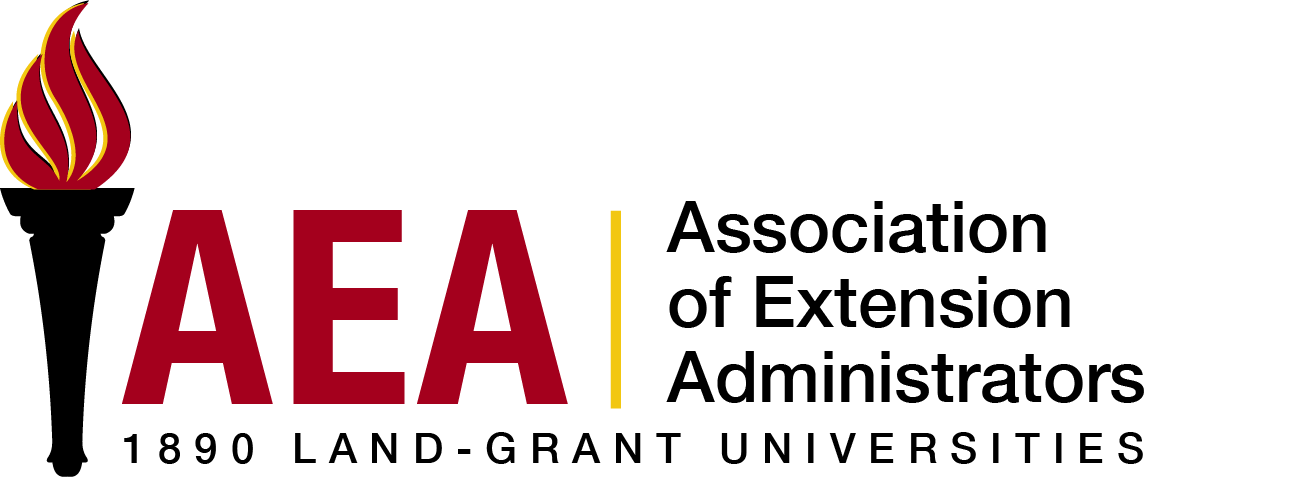Extension Today
News from and about the 1890 Land-Grant Extension SystemMessage from the Chair

Dr. Raymon Shange 1890 Extension Administrator, Tuskegee University
I hope that all of you have had a wonderful and productive May. As some of our farmers are enjoying their first harvest of the season while others are planting for the season, the Association of Extension Administrators (AEA) looks to highlight how our region empowers farms and communities through agricultural events.
At the very foundation of our system is the service that we provide to our communities based on improving food production and access for both rural and urban populations. From farmer institutes and conferences, publications and farm demonstrations, our predecessors have laid a solid foundation of how to provide research-based information for improving local food systems.
Today, we continue to build on that legacy, honoring tradition while evolving to meet current needs. We invite you to explore this issue, and thank you for your ongoing support of the 1890s AEA and the growing community we proudly cultivate together.
Empowering farmers through the Alabama Goats and Sheep Summit
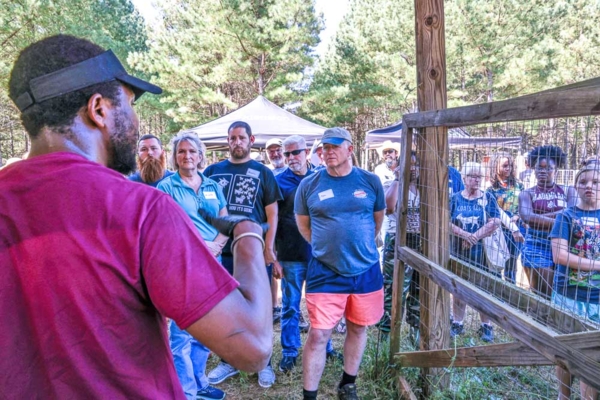
By Dr. Felix U. Samuel
Agriculture is the backbone of many economies, especially in rural areas where small-scale farmers rely on livestock and crop production for their livelihoods. To enhance productivity and sustainability, agricultural events such as workshops, summits, training sessions and field demonstrations are crucial in empowering farmers and communities.
They also serve as a vital link between researchers and farmers to ensure that innovations reach the field while keeping scientists informed of farmers' needs. In addition, through hands-on training, farmers gain expertise in modern techniques, such as animal husbandry, disease prevention, efficient feeding practices and other best practices in animal health management.
The Alabama Goat and Sheep Summit, usually held in September each year at Alabama A&M University's Winfred Thomas Agricultural Research Station, demonstrates the transformative impact of agricultural events in empowering communities and advancing livestock farming. Hosted by the Alabama Cooperative Extension System’s Small Ruminant Program, this event is led by Extension Specialist Dr. Felix U. Samuel and his team, Urban Regional Extension Agent Lauren Shortnacy and Lead Goat Technician Daivon Allen.
Small ruminant producers in Alabama face persistent challenges, such as parasite resistance, climate-related forage issues, youth disengagement and limited access to science-based management practices. In 2024, the Alabama Goat and Sheep Summit addressed these issues through targeted training sessions. Additionally, hands-on field activities on silvopasture systems highlighted strategies for mitigating heat stress, diversifying forage and enhancing soil health. The event also incorporated interactive sessions for youths to spark an interest in agricultural careers and featured expert-led presentations on nutrition, market diversification and climate adaptation strategies.
The summit culminated in meaningful networking opportunities to showcase how agricultural events empower producers, foster innovation and build resilient farming communities across Alabama.
Alcorn Extension empowers farmers through soil health workshops
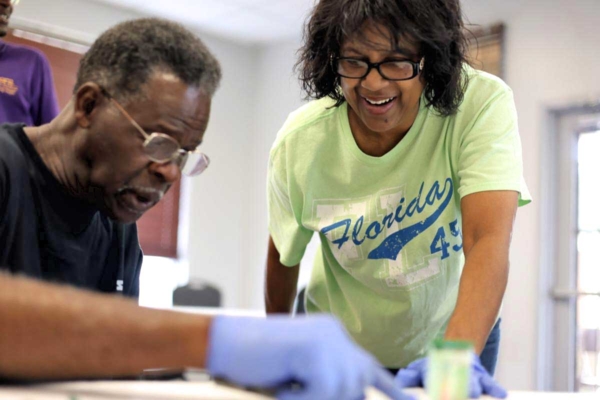
Soil is the foundation of successful farming, and Alcorn State University’s Extension Program is helping Mississippi farmers unlock its full potential.
Through a series of hands-on soil health workshops held across several southwestern counties, Alcorn Extension is equipping growers with tools and knowledge to make informed, cost-effective and sustainable decisions. The workshops offered practical training in on-site soil testing, allowing farmers to test their own soil samples and assess critical factors such as pH levels and essential macronutrients — nitrogen, phosphorus and potassium.
By actively participating in the process, participants gained a deeper understanding of their soil conditions and how to tailor their farming practices accordingly.
“Knowing exactly what your soil needs allows you to reduce waste, save money and grow healthier crops,” said Dr. Emran Ali, horticulture specialist with the Alcorn Extension Program. “It’s a practical step toward sustainability and increased productivity.”
In addition to testing, attendees explored sustainable land management practices such as using cover crops, adopting crop rotation strategies and customizing fertilizer plans based on site-specific results. These methods not only improve crop yields but also support long-term soil health and environmental stewardship.
Understanding the exact needs of their soil allows farmers to reduce unnecessary input costs and increase production efficiency, both vital for profitability and sustainability.
From fast track farming to frontline change: Kunta Jackson's rooted revolution
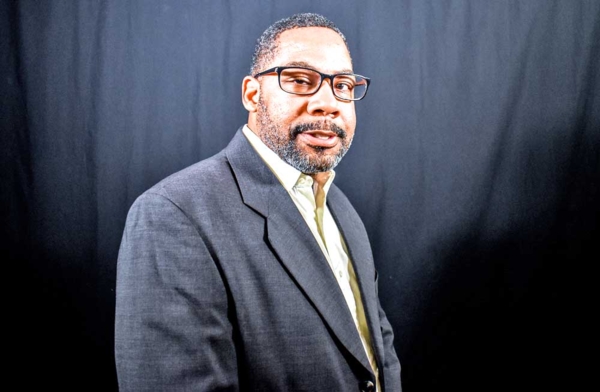
Kunta Jackson, an educator in community and economic development for the Southwest Region of Central State University's Extension (CSUE), is a proud graduate of the 2021 Fast Track Farming program in Trotwood that equips aspiring farmers with classroom instruction and hands-on experience at an incubator farm. Formerly an FDIC bank examiner, Jackson joined the Fast Track Farming program to embrace sustainability and grow his own food. Today, he cultivates tomatoes, radishes and strawberries, foods he once only dreamed of harvesting.
Jackson's first exposure to the incubator farm was more than just agriculture. "I saw people that looked like me making efforts to address food insecurity and planning for self-sufficiency," he said. Given the circumstances of food deserts in several communities, especially after North Dayton lost a major grocery store, the work felt urgent and necessary for Jackson.
The program offered more than technical training; it deepened his respect for the land and connected him spiritually. "It brought me closer to myself and God," he said. Learning from seasoned gardeners and understanding soil health transformed his relationship with food.
In September 2023, Jackson joined CSUE professionally and leads financial literacy efforts to address the wealth gap in underserved communities around southwest Ohio. For him, teaching is about meeting people where they are and reminding them that transformation is possible. One story that fuels his passion involves helping a former school principal's church members, many of whom were returning citizens, navigate re-entry and workforce development.
"It is about empowering people," Jackson said.
Jackson hopes his legacy as a CED educator is one of connection and bringing CSUE's resources into homes, farms and communities.
Profiting from a few acres: More than 15 years of impacting Delaware’s small farms
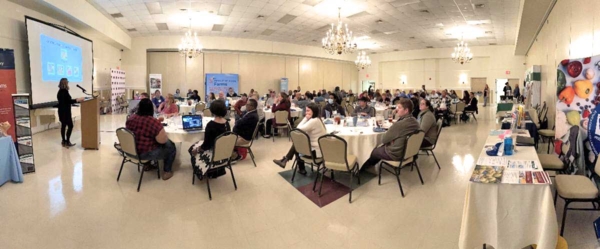
For more than 15 years, Delaware State University’s Profiting from a Few Acres (PFFA) Conference has been a cornerstone event for small-scale and beginning farmers across the state. With an average of 100 participants each year, this one-day conference provides high-impact education aimed at helping farmers diversify their operations, manage risks and increase profitability on small acreages.
Each year, PFFA features a successful farmer who shares their personal story of innovation and perseverance. In addition to this inspiring keynote address, local and national experts lead breakout sessions covering a variety of topics, including crop diversification, marketing strategies and U.S. Department of Agriculture risk management tools. The agenda is designed to deliver practical, research-based solutions that attendees can immediately implement in their operations.
Since its inception, the conference has supported producers in the region, many of whom have adopted new practices or launched new enterprises after attending. Surveys consistently show a satisfaction rate of more than 90% and a significant increase in knowledge and plans to adopt new practices among participants.
PFFA is more than just a conference; it is a growing network of farmers, educators and agricultural professionals committed to strengthening Delaware’s local food system. As one past attendee noted, “This event gave me the tools and confidence to turn my small plot into a profitable business.”
Delaware State University remains dedicated to supporting small farmers through continued education, hands-on resources and events like PFFA that cultivate success from the ground up.
FAMU Cooperative Extension leads the way in farmer training, community empowerment
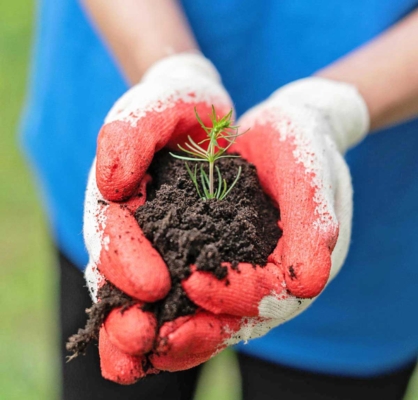
Under the dynamic leadership of Dr. Gilbert Queeley, the Florida A&M University (FAMU) Cooperative Extension Program is addressing one of agriculture’s most pressing challenges – cultivating a new generation of successful, knowledgeable farmers and ranchers.
The Beginning Farmer and Rancher Development Program (BFRDP), administered through FAMU Cooperative Extension, is a transformative training initiative designed to equip aspiring agricultural professionals with the tools, knowledge and real-world experience necessary to thrive in today’s evolving food system.
At its core, the BFRDP focuses on sustainability, self-sufficiency and economic development. The program trains participants, many from underserved and underrepresented communities, in a range of critical agricultural areas, including crop production, livestock management, marketing and entrepreneurship, and appropriate agricultural technology.
Beyond technical training, the BFRDP plays a critical role in revitalizing communities. By equipping residents with the skills to launch or expand their agricultural businesses, FAMU Cooperative Extension helps strengthen regional food systems, enhance food security and stimulate local economies. Graduates of the program often go on to establish community gardens, start niche farms and serve as peer educators in their neighborhoods, creating ripple effects of empowerment and resilience.
“Our goal is not just to teach people how to farm,” says Queeley. “It’s to build capacity, ownership and leadership within communities. This program represents FAMU’s commitment to sustainable agriculture, equity in access to resources and long-term community development.”
Fort Valley State hosts family and consumer sciences conference
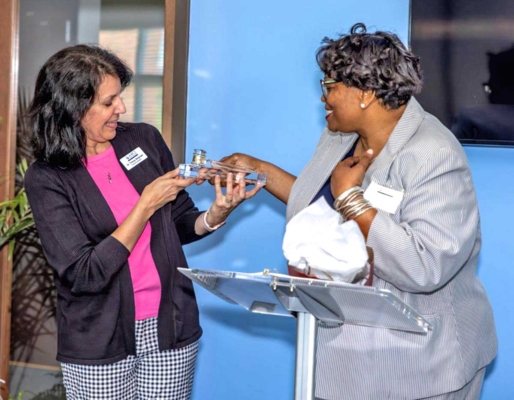
By Russell Boone Jr., Public Information Editor/Writer
Fort Valley State University’s (FVSU) Family and Consumer Sciences (FACS) Program hosted the 2025 Georgia Association of Family and Consumer Sciences (GAFCS) Conference.
The event, held at FVSU’s Family Development and Child Life Center, drew more than 50 faculty, staff, students and other personnel associated with family and consumer sciences from across the state of Georgia.
Kena Torbert, interim program leader and family life specialist for FVSU’s FACS Program, serves as the president-elect for the GAFCS. She also serves on the American Association for Family and Consumer Sciences (AAFCS) Council for Certification. She said the event served as a training exercise for all participants.
“FACS professionals discussed a variety of subjects impacting the profession. This includes the application of technology such as artificial intelligence (AI) and FACS education in the state of Georgia from high school to college,” Torbert said.
Dr. Francine Hollis, chair of FVSU's FACS Department, said it was fantastic that the GAFCS selected FVSU as the site for the 2025 conference.
“FVSU’s FACS Program is making a significant impact on the community, and so we are always willing to help and support the GAFCS,” she said. “Our students have worked with the Women, Infants and Children (WIC) Supplement Nutrition Program in Peach County.”
The FVSU instructor also added that FACS students gain additional hands-on experience by providing instructional support to various elementary schools and childcare development centers in the county.
Jaequon Henderson, an FVSU graduating senior majoring in food and nutrition, said the conference enlightened him on the vast opportunities available with a FACS degree.
Spreading skin cancer awareness among farmers
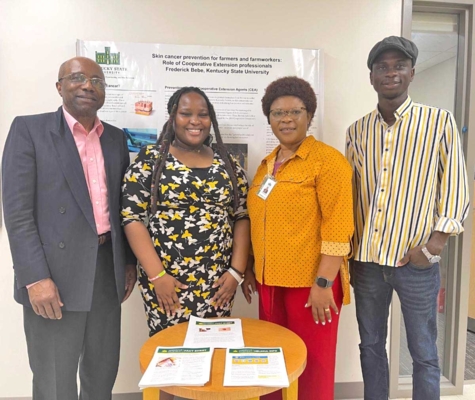
Skin cancer is the most common of all cancers. The last 40 years have seen a significant increase in the incidence of skin cancer in the U.S., faster than any other cancer. Melanoma, the deadliest of all skin cancers, accounts for the majority of all skin cancer deaths. Kentucky ranks seventh in the rate of new melanomas in the U.S., and the incidence rate (28.2) is higher than that of the U.S. (22.9) per 100,000 people, 20% higher.
To address this, Kentucky State University’s (KSU) Dr. Frederick Bebe and his team have been researching the prevalence of skin cancer in Kentucky farmers since 2023. This May, the research team will survey farmers and collect data. This project is in collaboration with Northern Kentucky University and Berea College as part of a three-year U.S. Department of Agriculture's National Institute of Food and Agriculture grant intended to increase statewide awareness of skin cancer, influence early detection and contribute to the health and wellness of Kentucky’s farming community.
To share best practices with farmers, KSU holds a monthly workshop titled “Third Thursday Thing,” which focuses on a variety of agricultural topics, trends and tips. This May, as part of National Skin Cancer Awareness Month, Bebe and his team will present their work and educate Kentucky farmers on the importance of skin cancer prevention.
Some best practices include avoiding high ultraviolet sunlight levels, using broad-spectrum sunscreen that is SPF30 or higher, reapplying sunscreen regularly, wearing protective clothing and using sunglasses with 100% UV protection.
Langston University hosts Food, Agriculture and Natural Resources Conference
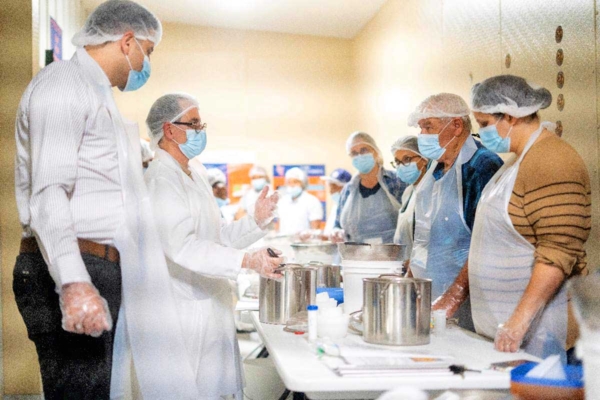
In a warm and welcoming atmosphere, Langston University’s Sherman Lewis School of Agriculture and Applied Sciences successfully hosted its third annual conference on food and agriculture on April 25–26. Themed “Growing Together: Fostering the Resilience of Communities, Food and Agricultural Systems,” the conference convened more than 350 participants, all committed to advancing sustainable agriculture and resilient food systems.
The two-day gathering featured a powerful mix of symposiums, hands-on workshops and live demonstrations, all free and open to the public. Every session was crafted to inspire, inform and strengthen community ties — bridging the gap between science, agriculture and local producers.
The conference was marked by strong interaction and cross-sector collaboration. Sessions like “How to Develop Your Market” offered actionable strategies to help producers market their agricultural and artisanal products locally. Attendees left not only more informed but also energized and ready to elevate their businesses.
Youth programming was another conference highlight. On day two, children aged 6 to 17 engaged in science, technology, engineering and mathematics and 4-H activities, gaining early exposure to agricultural sciences through fun, educational experiences.
One memorable moment came from Kim Lee, administrator of Committed to Build and Beautify Taft Inc. in Muskogee County, who shared:
“We look forward to your conference on resilient agriculture each year, and each year the event improves...The panel on Uplifting Oklahoma Communities was very informative, and we’ll be following up with TSET about the funding opportunities shared during the session.
Lincoln University programs provide education, support, opportunity
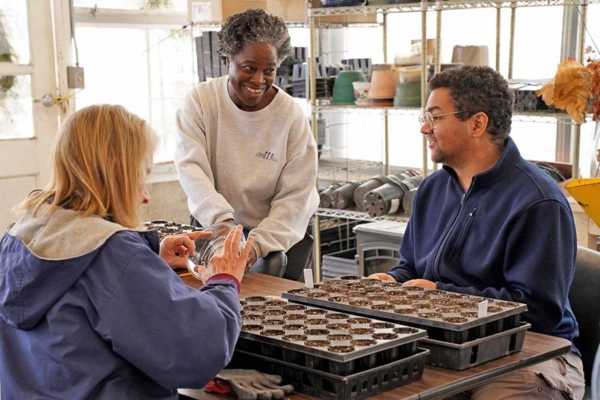
Empowering farmers and their communities is a core pursuit of Lincoln University Cooperative Extension (LUCE).
Through various programs, workshops and events, LUCE supports producers with the resources and support they need to be successful and provide for their communities. Just recently, Dr. Nadia Navarrete-Tindall, Lincoln University (LU) professor and LUCE specialty crops specialist, hosted a workshop on native fruit pruning in Missouri’s Bootheel. The workshop taught attendees how to identify, grow and monetize native fruits.
Navarrete-Tindall said these workshops help people create good environments. By surrounding themselves with native plants, they can provide nutritious food for themselves and their communities and make money.
Another workshop, hosted by Dr. Waana Kaluwasha, an assistant professor of plant pathology at LU, taught attendees how to identify, diagnose and treat soilborne pathogens that affect crops. Kaluwasha said losing crops to disease can be devastating to farmers’ livelihoods and stressed the importance of preventing disease spread in the first place.
Additionally, LUCE supports farmers and producers with the Lincoln University Farmers Market, an offshoot of the Specialty Crops Program. The farmers market gives local growers, small and large, the chance to sell their crops and products, filling the gaps left by other providers.
“Now more than ever, community is what’s needed. Farmers Markets are there to provide a healthy community for people and offer people goods, products and produce that may be more expensive or harder to find elsewhere,” said Sage Jakobi, market manager.
Educational sessions at Small Farms Week give small-scale farmers ideas for growth
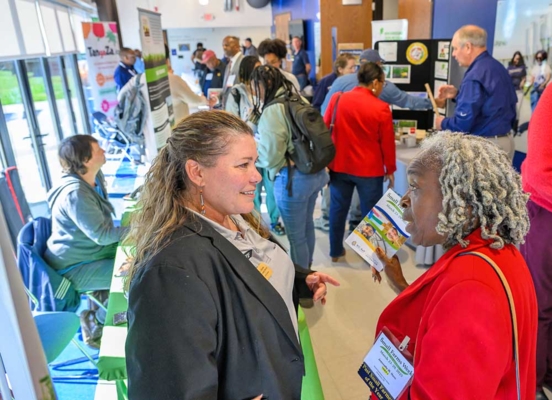
Farmers, Extension agents and others interested in small-scale farming gathered at the North Carolina Agricultural and Technical State University Farm to learn about everything from using technology in farming to growing specialty crops.
About 200 people attended the sessions on March 25-26, part of the 2025 Small Farms Week organized by N.C. A&T Cooperative Extension.
“This week we’ve highlighted how to integrate AI into your operation, new crops, new markets, how to preserve family land, resolve heirs’ issues and tips on getting digital with weather stations, drones, moisture sensors and real-time crop monitoring,” said M. Ray McKinnie, Ph.D., associate dean and administrator of Cooperative Extension at N.C. A&T.
“It’s our mission to make these subjects available for you and to help you with their adoption,” he said.
Michelle Ross, whose family has owned a 10-acre farm in South Carolina for more than 100 years, found the session on heirs’ property “very helpful.”
“I’ve been dealing with an attorney here in North Carolina about heirs’ property, forming an LLC and doing the whole lineage thing so that it can stay in our family, even if we were married (and then divorced),” Ross said.
A panel discussion featured past Small Farmers of the Year award winners. “Farming is a business, and time is money,” panelist Millard Locklear said. “Do the best you can, get all the knowledge you can and if (something) isn’t working, drop it; don’t waste any more time.”
Ag Day on 'The Hill': Engaging, educating, empowering producers and communities
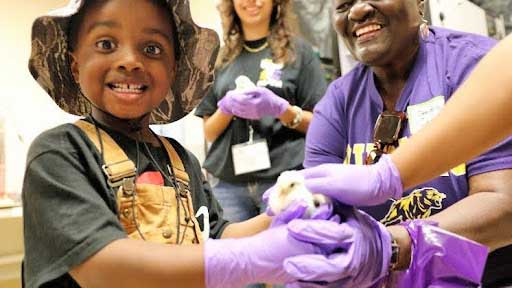
By Angela L. Moore, Program Coordinator, PVAMU Extension-Ag and Natural Resources
The College of Agriculture and Human Sciences (CAFNR) continues to engage farmers and communities through its annual spring event, Ag Day on “The Hill.” Originally launched as a one-day Goat Field Day, this event has evolved into a two-day educational experience that attracts more than 200 participants from across Texas.
The event highlights CAFNR’s tripartite mission of academics, research and Extension while showcasing the university farm through interactive presentations and hands-on activities for all ages.
Day one, known as Youth Day, welcomes students from public schools and homeschool groups, offering grade-appropriate sessions designed to spark interest in agriculture. Activities include a petting zoo with baby goats and chicks, a roping demonstration, a "food fear factor" session featuring unique food tastings and tours of the meat lab, where students observe the meat processing process.
Family Day, held on day two, is geared primarily toward adult attendees, especially agricultural producers. The day begins with a keynote address followed by breakout sessions led by CAFNR researchers, PVAMU Extension specialists and other experts. Topics span agriculture and natural resources, 4-H, family and community health, and community and economic development.
Ag Day on “The Hill” provides a fun, family-oriented atmosphere while addressing serious agricultural issues and opportunities. Feedback collected through post-event evaluations has been instrumental in refining and expanding the event’s offerings. This annual gathering continues to serve as a valuable platform for educating, empowering and connecting producers, landowners and communities throughout the state.
SC State PSA hosts Small Farmers Conference, empowering farm producers
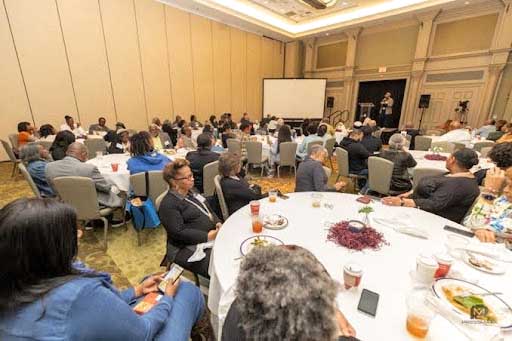
Farmers across South Carolina gathered from March 13 to 16 for the Small Farmers Conference at the Marina Inn at Grand Dunes, Myrtle Beach. The event aimed to empower small-scale farmers with the necessary knowledge and resources to sustain their operations and protect their generational legacies.
"The Small Farmers Conference provided an invaluable platform for our farmers to come together, learn and grow," said Dr. Edoe Agbodjan, 1890 Extension associate administrator. "Through insightful presentations, hands-on workshops and valuable networking opportunities, we wanted our farm producers to gain practical knowledge on the latest agricultural practices. We remain committed to empowering farmers with the necessary resources to thrive in today's dynamic agricultural landscape."
The conference included sessions on tax and business management, heirs' property, food safety, pest control, risk management and urban agriculture. Presenters featured leading experts, farmers, advocates and educators who shared strategies to empower farmers to enhance their business models and agricultural practices.
Dr. Louis Whitesides, vice president of SC State Public Service & Agriculture, delivered a keynote address about the importance of protecting family land through proper estate planning.
"This conference gave me tools to manage my business better and protect my land. I left with actionable steps that I plan to implement on my farm," said Mary Kirkland, a small farmer who attended the conference.
Growing knowledge, growing farms: The role of the SU Ag Center’s Small Farmer Academy
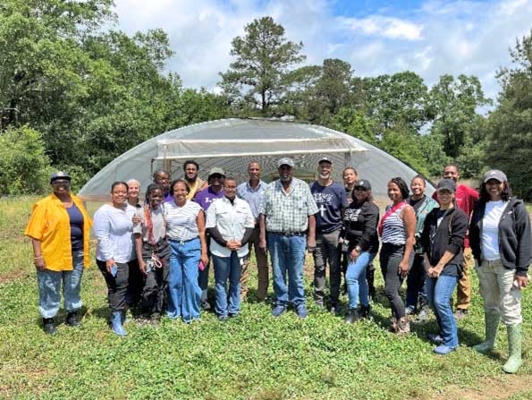
By Zanetta Augustine
The Southern University Ag Center’s Cooperative Extension Program’s Small Farmer Academy stands as a vital resource for new and existing farmers across Louisiana. As community interest continues to grow, the academy responds to the diverse needs of producers, whether they are exploring U.S. Department of Agriculture (USDA) resources, seeking land-use guidance or working to improve profitability in operations such as cow-calf or vegetable farming.
This hands-on program equips participants with practical knowledge and technical assistance, enabling them to make informed decisions and thrive in today’s competitive agricultural industry. Farmers gain access to expert-led workshops, on-farm demonstrations and personalized training in areas such as farm planning, soil health, animal care and marketing strategies. By focusing on both production and business management, the academy helps producers identify opportunities, avoid costly mistakes and strengthen their operations.
Beyond skills training, the academy serves as a bridge between farmers and agencies like the USDA, Natural Resources Conservation Service and Farm Service Agency. Participants learn how to navigate funding programs, apply for grants and implement conservation practices, ensuring they make the most of the resources available to them.
Under the leadership of Coordinator Cornelius Jackson, Program Leader Zanetta Augustine and the agricultural and natural resources team, the Small Farm Academy not only provides education but also ongoing support. This empowering combination enables producers, whether just starting or seasoned in the field, to unlock their farm’s potential, increase profitability and contribute meaningfully to local food industries.
Through connection, education and innovation, the SU Ag Center’s Small Farm Academy is truly cultivating a stronger, more resilient generation of Louisiana farmers.
TSUAg’s Tennessee New Farmer Academy celebrates decade of helping state’s small farmers
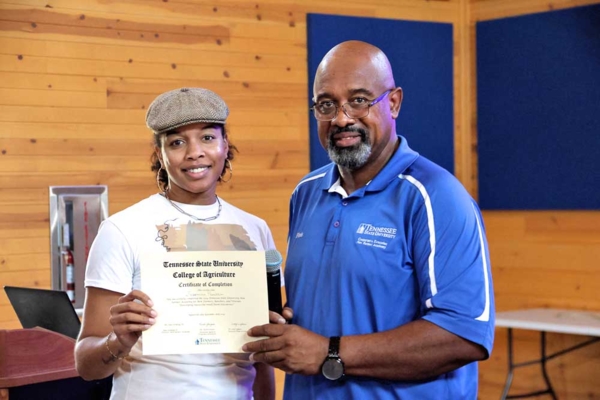
By Charlie Morrison
This fall, more than 100 new and beginning farmers received their diplomas after graduating from the 2024 Tennessee New Farmer Academy lecture and event series. This year’s graduating class was the 10th such group since the Tennessee State University College of Agriculture (TSUAg) Extension program first began offering the academy in 2014.
The members of this year’s graduating class joined hundreds of other academy alumni who have grown their knowledge and skills at the program over the past decade on their way to becoming successful agriculture entrepreneurs.
The Tennessee New Farmer Academy is a seven-month certificate program held annually at three locations across the state that focuses on teaching the concepts, providing the information and facilitating the hands-on experience needed to build solid, viable and successful agricultural businesses.
Typical participants in the program include those who are new to agriculture, those transitioning into agriculture from another field and those who are looking for a post-retirement opportunity. Tennessee Commissioner of Agriculture Dr. Charlie Hatcher has called the academy one of the best new farmer assistance programs in the country.
Longtime Extension professional Finis Stribling III founded the program back in 2014 along with TSUAg Cheatham County Farm Manager Chris Roberts, welcoming just nine participants to the TSU campus for the first seven-month run. What started with nine, however, grew each year. These days, there is a waiting list for each run of the program.
UAPB engages with gardening enthusiasts at Delta Blooms and Bees Home and Garden Show
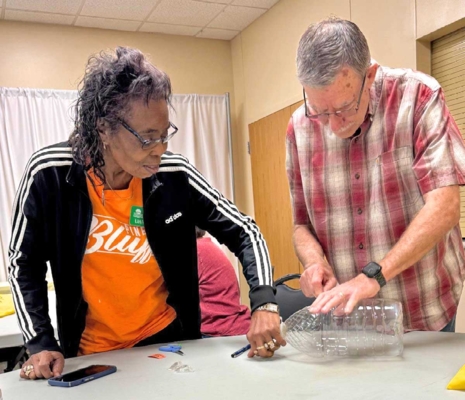
The University of Arkansas at Pine Bluff (UAPB) School of Agriculture, Fisheries and Human Sciences recently participated in the Delta Blooms and Bees Home and Garden Show in White Hall, Arkansas.
Lurie Lee Anderson Jr., UAPB research associate, volunteered his time to lead a hands-on DIY “Make and Take” Worm Composting Jug demonstration.
“The material to make a worm tower is typically made of PVC pipe, which would be long-lasting,” Anderson said. “A compost jug, however, can be made up from any container such as a milk jug or a juice bottle. These items work well, and using them removes extra waste from landfills.”
The garden show gave people who have the same passion for gardening and farming a place to network and trade methods of production, he said. Other presenters included Dr. Chris Cooper, University of Tennessee Extension horticulture agent and coordinator for the Extension Master Gardener Program in Shelby County, and Timothy Wallace, University of Arkansas Division of Agriculture County Extension agent for horticulture and 4-H in Jefferson County.
The show also included a variety of exhibits, workshops, children’s activities, raffles and a plant sale. The Jefferson County Master Gardeners' annual fundraising event benefits area youths and community education programs. It is sponsored by the Jefferson County Master Gardeners, the University of Arkansas Division of Agriculture, Jefferson County and the Pine Bluff/Jefferson County Clean and Beautiful Commission.
UMES Extension workshop series informs on issues of heirs’ property
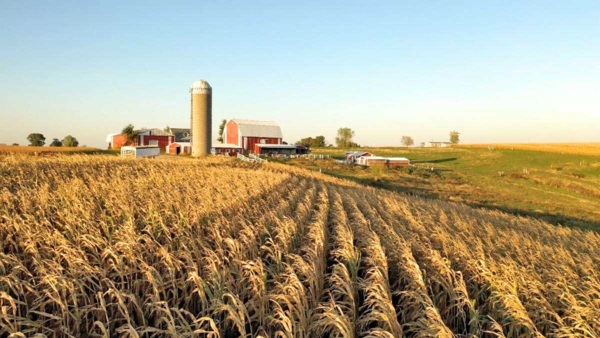
The University of Maryland Eastern Shore (UMES) embarked on a mission in 2025 to disseminate information on the prevention of and possible resolution of problems associated with heirs’ property. Through a series of monthly UMES Extension workshops across Maryland and accompanying activities, more than 1,000 people learned about this issue.
Heirs’ property is family-owned land inherited by multiple generations without the formal legal documentation to prove ownership. This matters because heirs are at risk for losing the property or could have trouble securing funding, receiving benefits or selling the property, among other issues.
Lila Karki, associate professor of agricultural economics and Extension specialist, and colleagues formed partnerships with 15 institutions or organizations to strengthen the effort’s reach. At the conclusion of the workshop series, there was an increase in people seeking referrals or following up by consulting professionals and legal specialists on their unique heirs’ property situations. Also, participants asked for future virtual awareness sessions.
Some of the prevention strategies relayed included estate and succession planning, effective will writing and managing fractional ownership. UMES Extension agricultural events like this are aimed at empowering farmers and assisting Marylanders with solutions to everyday challenges.
A celebration of growth, community at VSU’s third annual AgFest
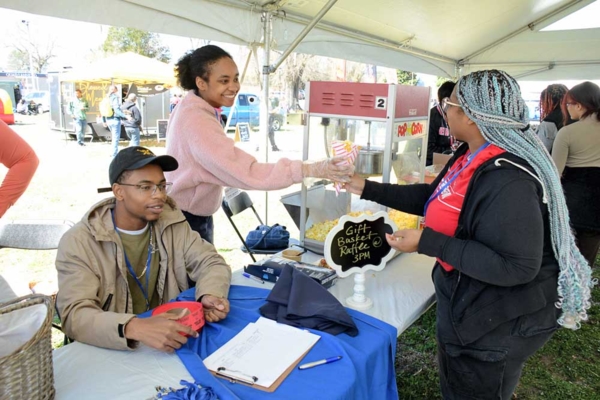
Recently, Virginia State University’s (VSU) College of Agriculture (COA) hosted its third annual AgFest to celebrate National Ag Day’s theme of “Together We Grow.” Community members, vendors and VSU students, faculty and staff came together to showcase agriculture’s integrated connections.
"AgFest is a powerful reminder of how agriculture connects us all — across generations, communities and industries,” said Erica Shambley, director of marketing and communications for COA. This year’s celebration was the largest to date and won the “Student Choice – Best Event” award at the VSU Student Organization Awards.
At AgFest, educational and interactive exhibits, farm-to-table food and live entertainment provided a backdrop against which attendees, 20 local farmers and the VSU community could engage with one another. Students from different colleges and organizations attended or volunteered. For many, it was an opportunity to deepen their understanding of agriculture and the people who work across the industry.
Junior psychology major Miyah Hernandez met the United States' youngest registered farmer, 9-year-old Kendall Rae Johnson. Hernandez says, “My takeaway is you’re never too young to make a difference. We learned so much from Kendall’s inspiring journey. It was a reminder that passion and determination can pave the way for transformative change.”
Beyond celebrating agriculture, AgFest celebrates how VSU’s COA supports the community with research-backed instruction for growers and the public, a commitment to student education and growth and a drive to find solutions for today’s modern problems.
Workshop series on high tunnel agriculture launched by WVSU, NRCS
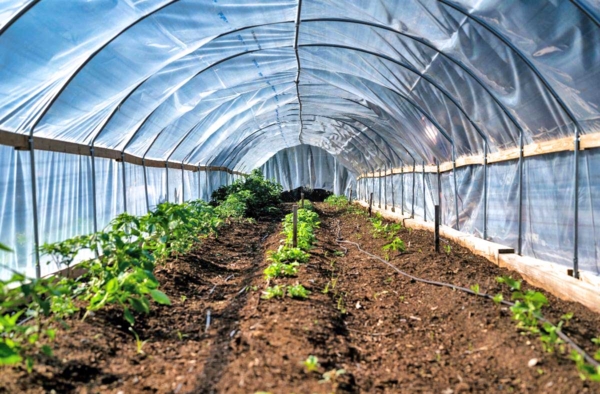
By Alisha Jarrett
West Virginia State University (WVSU) Extension Service, in collaboration with the U.S. Department of Agriculture's Natural Resources Conservation Service (NRCS), is hosting a free comprehensive workshop series focused on high tunnel agriculture. Aimed at novice and experienced growers, these workshops enhance participants’ understanding and practical skills while promoting sustainable farming practices.
The series will begin with an introductory session on high tunnels, discussing their benefits and exploring NRCS cost-share programs available to growers. Following this, an in-depth workshop on high tunnel irrigation will cover various watering methods alongside funding opportunities offered by NRCS.
As growers decide what to cultivate, a specialized workshop on production planning will assist them in selecting suitable crops and optimizing tunnel layouts. Marketing and sales classes will provide strategies for effectively selling produce and connecting with customers. Furthermore, the series addresses pressing issues such as food access and empowering local producers to face community food distribution challenges.
“Participants will learn how to extend their growing season and boost production for local markets, which can significantly benefit the community,” said WVSU Agriculture and Natural Resources Extension Educator Beth Villers. “This initiative promotes personal gardening success and strengthens the local agricultural economy.”
Monthly sessions will also focus on essential topics like growing transplants, soil health, pest management and the seasonal production of vegetables, fruits, flowers and herbs.
